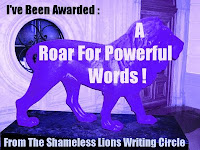 This week I received some unexpected and highly gratifying news: Lisa Romeo, a writer I’ve come to know “virtually” and whose work I expect to be reading well into the future, gave me a “roar,” including me with four other “fearless writers” as part of a new blog project.
This week I received some unexpected and highly gratifying news: Lisa Romeo, a writer I’ve come to know “virtually” and whose work I expect to be reading well into the future, gave me a “roar,” including me with four other “fearless writers” as part of a new blog project.
Confused? I’ll admit that I was, too. Here’s the deal: Lisa was effectively tagged for this project, which “aims to celebrate good and powerful writing in the blogosphere.” Those so tagged are asked to post the “award” on their own blogs; list three things they believe “are necessary for good, powerful writing”; and then move the project forward by passing the award on to five additional blogs they deem worthy: “Let’s send a roar through the blogosphere.” (To see Lisa’s incredibly kind words about me [truly, she can’t begin to know how much I appreciate them], and to discover the identities and blogs of her other “roars,” click here.)
As for my own views on three elements of “good, powerful writing,” I offer the following:
CLARITY. If I have to struggle to understand it, you’ve lost me at hello (or your piece’s equivalent).
CONVICTION. Passionate writing is powerful writing. Which is not to say that your passion shouldn’t be appropriately reined in. See immediately above. And immediately below.
CREDIBILITY. Be honest. Do your research. Admit your biases. Acknowledge counter-argument. Then you’ll really be writing good, powerful material.
And now, without further ado, I am delighted to present five more writers who merit a “roar.”
B.J. Epstein. More than four years after my graduation, I (still) have a lot of ambivalent feelings toward my MFA program/experience. But I’ve never had any doubt in my good fortune in encountering B.J. Epstein there. B.J. is a “powerful” writer who seems remarkably unaware of just how extraordinary she is. She applies her very considerable intelligence, curiosity, and sheer work ethic to multiple forms of writing. I met her through her fiction. But she is an accomplished editor, translator, and English teacher. My own writing has benefited time and again from B.J.’s critical attention; I’m always learning about translation at her Brave New Words blog.
Seth Gitell. I didn’t know Seth well in college (we were classmates). But I read his articles in The Crimson then, and I visit his “Dispatches” blog regularly now. Currently a columnist and contributing editor of The New York Sun (and a frequent contributor to Boston Magazine), Seth served as press secretary to Boston Mayor Thomas M. Menino from 2003-2006. He’s exceedingly well-informed, and a fine writer. Recently, I’ve especially enjoyed his dispatches from the presidential campaign trail, and I know I’ll keep reading as the 2008 election season becomes even more intense.
Erin O’Connor. Given my current “day job” in academic administration, I do try to keep up with a number of “academic” blogs. And one I check regularly is Erin O’Connor’s Critical Mass (and O’Connor was blogging under that title well before the NBCC Board of Directors took it on). O’Connor is an English professor, and looking at her course titles it’s not hard to understand that she takes writing seriously. She brings that seriousness (not to mention a scrupulous approach to documentation) to her blog, and I, for one, appreciate it.
Connie Schultz.Technically, Schultz is not a blogger. But ever since I attended her presentation at last year’s Nieman Narrative Nonfiction Conference, and heard her read from her Pulitzer prize-winning columns, hers is one of the first names that comes to mind when I think of “fearless writers.” And when I went searching for some links to share with you, I wasn’t surprised to discover that she has, in fact, put in some blogging time over on the Huffington Post (where, among other things, she addressed fearlessness). After a period on leave from her Cleveland Plain Dealer column (during her husband’s campaign for the U.S. Senate), Schultz is back writing for that paper. For the sake of this post, let’s consider the online archive of her columns a “blog” of sorts.
Martin Solomon. I’ve never met Martin, and I’ve only recently discovered his blog, Solomonia. But I’m impressed by what I’ve found there, and almost awed by the honesty that pervades it. Martin is not afraid to tell you what he thinks, and he’s equally willing to put his time, brainpower, and writing skills in service of those beliefs. That’s powerful.
